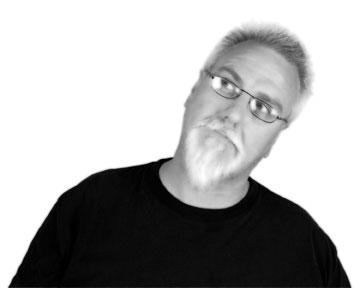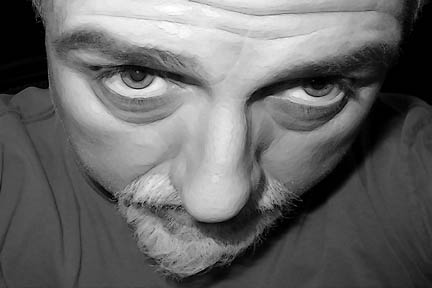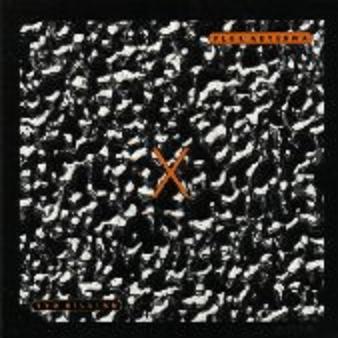


| TED KILLIAN | ||||||


|
||||||
|
|
||||||
|
|
||||||
| BIOGRAFIA/BIOGRAPHY | ||||||
|
Nasce nella California del Sud (terra in cui il rumore chitarristico cresce rigoglioso) 48 anni fa, è musicista da oltre 38, e da sempre grande sperimentatore/esploratore della chitarra elettrica. Nei tardi Eighties, comincia a suonare la sua originalissima musica nella manifestazione "The Ventura New Music Concert Series (California del Sud), coadiuvato dall’amico/collega, trombettista "avant-jazz", Jeff Kaiser (che ha anche dato il suo prezioso contributo alla realizzazione del cd), iniziando così una lunga serie di concerti attorno al suo paese natìo. English version Born of the fertile soil of Southern California (where growing guitar noise requires some rigor) 48 years ago, he has been a musician for 38, and always a great experimentor/explorer of the electric guitar. In late the Eighties, he began to play his very original music in the showcase "The Ventura New Music Concert Series" in Southern California, with encouragement from friend/colleague, avant-jazz trumpeter, Jeff Kaiser (who has also given his valuable contributions to the realization of this CD), beginning a long series of concerts around his native region. |
| FLUX AETERNA | ||||||||

|
||||||||
|
||||||||
| Lista dei brani/Tracks list | ||||||||
|
||||||||
| La recensione/The review | ||||||||
|
Siamo in un’epoca in cui imperversano sul mercato programmi per computer e schede audio di sempre più stupefacente sofisticazione; i sintetizzatori, i campionatori, le batterie elettroniche si vendono più delle chitarre elettriche. Non v’è dubbio alcuno che ai musicisti e ai discofili relativamente consapevoli, in una dimensione squisitamente computerizzata, lo strumento senza il quale il rock non sarebbe mai esistito e che ha marchiato a fuoco l’ultimo mezzo secolo di musica, dal folk alla classica, appaia in profonda crisi. Ma così non è, poiché è proprio con la chitarra che sono state prodotte alcune fra le opere più stimolanti dei Nineties e del nuovo secolo. Una di queste è senza dubbio FLUX AETERNA di Ted Killian. È il primo album solista e il capolavoro di questo sublime chitarrista, un’opera di rock sperimentale fino all’esaurimento nervoso, in cui il "nostro" rivela il suo debito verso Robert Fripp, Brian Eno, Jimi Hendrix, David Torn, Steve Tibbetts, Uli Jon Roth, Sun Ra, tanto per citarne alcuni, amalgamando queste influenze in uno stile fatto di note dissonanti, distorte, allungate, infinite, sospese. In questo cd suona oltre alla chitarra elettrica, una chitarra acustica, loops, sampler, strumenti elettronici, dimostrandosi ad un tempo sia tutt’altro che estraneo alla tradizione del rock, sia in transito verso altri universi, con escursioni chitarristiche che dipanano filigrane come nuvole che annunciano un temporale. L’opener Hubble è la versione apocalittica di Star Spangled Banner, suonata da Jimi Hendrix al Woodstock Music Festival nell’estate del 1969. Leaving Medford è musica sperimentale allo stato puro, la chitarra è metallica (sembra che abbia il filo spinato al posto delle corde), dietro alla quale schizzano vetriolici noises industriali. Questo pezzo è l’espressione delle metropoli americane in decomposizione, afflitte dalla peste contemporanea che profuma di paranoia: l’alienazione. Cauterant Baptism, propulso da ripetitivi ritmi dub/hip-hop, è imperniato su arroventati quanto pirotecnici solismi di chitarra dalla dissonanza inaudita, ancora solo in nuce agli esordi del brano e pienamente in sboccio dopo circa 1:20 secondi. Last Sparrow contiene bestiali "fripperie", con forti incursioni di clangori industrial. Lugubri lamenti e percussioni junglesche (un po’ in sottovoce) caratterizzano Gravity Suspended. La midi guitar di Ted comanda dall’alto Recurvate Plaint e il chitarrismo acustico "operaio", sempre del "nostro", ne sta a debita distanza, ben consapevole che la chitarra elettrica può menare stilettate improvvise come un attacco epilettico. Convocation Solitaire è simile al precedente, ma svela strutture più ambientali a la David Torn. Anche in Nocternal Interstices, come in Last Sparrow, gli ammiccamenti a Sua Maestà Cremisi sono più che evidenti, e la chitarra "frippoide" di Killian vaga fra l’aspro/dissonante e il crepuscolare/melodico, applicando con estremo rigore le tavole della legge del dott. Fripp. Reverse Logic ha chiare reminiscenze "eno/byrneiane" (ascoltare My Life In The Bush Of Ghosts per credere), mentre la title track, che conclude l’album, è un coacervo di distorsioni fra le più viscerali e crude che si siano mai ascoltate nell’experimental music. Un cd cerebrale ed effettistico, imbevuto di nevrosi metropolitane, conteso fra astrattismi di dissonanze libere e violente sonorità elettriche, eseguito con grande classe. Ted Killian meriterebbe, a mio modesto parere, un posto all’Olimpo della musica d’avanguardia, insieme a Bob Fripp, Adrian Belew, David Torn, grazie ai suoi spericolati innesti di stilemi rock, loops frippoidi e noises industrial. English version We are in an age in which the product of computers and audio sound cards rage across the marketplace with more and more narcotic sophistication. Players of synthesizers, samplers, and electronic drums sell more than those of electric guitars. There is little doubt among musicians and relatively aware fans in this exquisitely computerized dimension, that the instrument without which rock could never have existed and has had the virility to fire the last half-century of music (from folk to classical) appears in deep crisis. But not entirely so, since it is with just the guitar that has been produced some of the more stimulating works of the Nineties and the new century. One of these is without a doubt FLUX AETERNA from Ted Killian. It is the first solo album and masterpiece of this sublime guitarist, a work of rock experimentation to the point of nervous exhaustion, which in "ours" it reveals its debit towards Robert Fripp, Brian Eno, Jimi Hendrix, David Torn, Steve Tibbetts, Uli Jon Roth, Sun Ra (a lot in order to cite of some) amalgamating these infuences in dissonance, composition and style, distorted, lengthened, infinite, suspended. On this CD the sound is heard (beyond the electric guitar, acoustic guitar, loops, sampler, electronic instruments, proving himself to be at once both contemporary and no stranger to the traditions of the rock) of rock in transition towards other universes, with guitaristic excursions that spread filigrees like clouds that announce a thunderstorm. The opener, Hubble, might be the apocalyptic version of Star Spangled Banner, played by Jimi Hendrix to the Woodstock Music Festival in the summer of 1969. Leaving Medford is musical experience in the pure state, the guitar is metallic (it seems to have razor-wire instead of strings), behind which oscillate acidic industrial noises. This piece is the expression of an urban America in decomposition, plagued from contemporary sickness and reeking of paranoia and alienation. Cauterant Baptism, propelled by the repetitive rhythms of dub/hip-hop, brazenly heats up to red-hot consuming other pyrotechnical solists of guitar from its mere dissonance, quiet only in the nuanced debut of the track and totally blooming after approximately 1:20 seconds. Last Sparrow contains beastly "Frippery", with strong incursions of clangorous industrial noise. Gloomy drones and jungle percussions (a po' in sottovoce) characterize Gravity Suspended. Ted's midi guitar commands from the heights on Recurvate Plaint with acoustic guitar always playing at a respectful distance, very aware that the electric guitarist can alter stylistic direction unexpectedly like an epileptic attack. Convocation Solitaire is similar to the previous one, but it reveals ambient structures closer to David Torn. Also, in Nocternal Interstices, like in Last Sparrow, the kinship to "His Crimson Majesty" are more than obvious, and the vaguely "Frippoid" guitar of Killian swerves between the breathless/dissonant and crepuscular/melodic, applying with extreme rigor the theories of Dr. Fripp. Reverse Logic has a clear "Eno/Byrne-sque" resemblance (listen to My Life In The Bush Of Ghosts in order to believe it). Meanwhile, the title track that concludes the album is a concoction of the most visceral and raw distortions that have never been heard in experimental music. This is a cerebral and sexy CD, imbued with urban angst, contrasting between free abstraction, violent dissonances and sonorous electric playing, executed with great class. Ted Killian would deserve, to my modest seeming, a place on the Mount Olympus of the musical vanguard with Bob Fripp, Adrian Belew, and David Torn, thanks to his fractal grafting of rock style, "Frippoid" loops and industrial noises. |
||||||||
| Demetrio Cutrupi |



